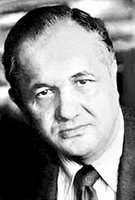 This post is a contribution to the blogathon at Film At 11 blog, dedicated to the anniversary of the publication of Andrew Sarris' seminal film book, The American Cinema.
This post is a contribution to the blogathon at Film At 11 blog, dedicated to the anniversary of the publication of Andrew Sarris' seminal film book, The American Cinema.When my interest in film seriously bloomed, it belonged to the days of going to the library and riffling through the racks, checking out books and discovering new passions at every turn of the page. Writings such as Stanley Kaufman's "World On Film", or selected essays by Pauline Kael, or J. Hoberman's seminal "Vulgar Modernism", or the National Society of Film Critic's series "Film 67/68" and "Film 68/69"- all of these books drew me closer (and sometimes farther away when I couldn't find a particular movie I desperately wanted to see based on the writings) to understanding the filmmaker behind the films. Here I was, a teenager in the early 90's digging back into the past when I should've been enjoying the latest "Terminator 2" or "Jurassic Park". I did like those, but my fervor existed solely in the past as I discovered Godard and the French New Wave, Ingmar Bergman, Federico Fellini, John Casavettes and counter-culture classics like "Easy Rider". If we don't know where we came from, how can we enjoy the present? And then I stumbled across Andrew Sarris and his book "The American Cinema". Here, finally, was a book that enveloped the same passion I was feeling by watching all these grand cinematic statements from the past. Also, the almost maniacal manner of categorizing and listing that Sarris utilized appealed directly to my own insatiable appetite for list-making. What "The American Cinema" did for me was provide knowledge that it WAS important to see "Persona" or "Breathless" or "The 400 Blows", but it was even more important to place these masterworks within a larger frame. It wasn't enough to see just those films, but then to watch ALL Truffaut, ALL Godard and certainly all Casavettes to decipher the fingerprint of the director over each film. "The American Cinema" opened up the possibility to me that there was someone greater behind the camera and his thoughts opened up a whole new discussion about "bodies of work"- an ideal that seems inherent in modern cinema. I quickly learned that the visual or emotional miracle of a film wasn't found in one principle work, but they manifested themselves, equally, over and over again through the course of several years. It didn't matter whether I was viewing a watershed film event of a director's career or a one-off B movie made before that director became famous. If you looked hard enough, the miracles were everywhere. Sarris understood that process of miracles and "The American Cinema" was his documentation of those miracles. And without that documentation, I don't know if I would love film quite as much as I do today. It gave me permission to choose favorites as well as introducing me to the term "auteur". And is there, really, a more foundational approach to cinema than that?
After discovering "The American Cinema" and once the internet consumed our every waking moment, Andrew Sarris was the first critic I read online weekly (with Ebert a very close second). The spirit of auteurism has never strayed far from Sarris' cinematic outlook. While my tastes in film weren't always compatible with his point of view (his preference for more Merchant Ivory fare, for example), I received immense joy from the graciousness of his reviews. I don't think any other film critic has the air of respect shown by Sarris in his writings, continually referring to each actor, director, writer or producer as Mr. and Mrs. throughout his pieces. And while he can certainly lash out vindictivly towards a film he deems of lesser value or social importance, his eye and ear are still close to the pulse of pop culture.. despite his age. He often found value in flashy efforts such as "Running Scared" (yes, that Paul Walker vehicle with a nasty ice rink showdown), "Run Lola Run"... or reveled in the profane, nihilistic portrayal of Billy Bob Thornton in "Bad Santa", his number 2 fav film of 2003- all of this while maintaining equal admiration for "Pride and Prejudice" and the entire career of Eric Rohmer.
Yet even though Sarris penned the ultimate statement on directors, there was always room for re-assessment as he reflected on older films, saw new films by old masters and recognized the brilliance of fresh faces. While some directors were sentenced to irrational pigeon-holing within his book as "Strained Seriousness" or "Lightly Likeable" and couldn't be erased in 1968, Sarris had no problem in adjusting and admitting a mistake in later print reviews. At the very least, "The American Cinema" should be regarded as a revisionist text in the finest sense, ripe for re-discovery today by any film lover struggling to understand the transient space between past filmmaking and modern artistry. And, for a writer who wallowed in categorization, Andrew Sarris certainly defies categorization today.
To see Andrew Sarris' "Best Of" lists from 1958 to the present, check here.
No comments:
Post a Comment